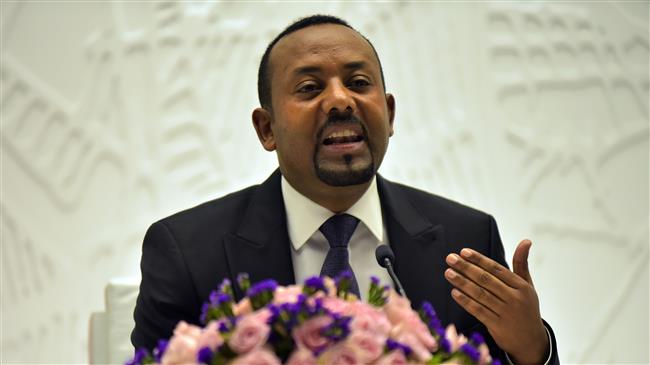Eritrea’s capital targeted with rockets launched from Ethiopia: Reports
At least three rockets launched from Ethiopia targeted Eritrea’s capital on Saturday night, five regional diplomats said, a major escalation of a conflict pitting Ethiopian government troops against rebellious local forces in the Tigray region.
At least two of the rockets hit Asmara airport, three diplomats said.
Tigray’s leader, Debretsion Gebremichael, said on Tuesday that Eritrea had sent troops over the border in support of Prime Minister Abiy Ahmed’s government but provided no evidence.
Eritrea’s Foreign Minister Osman Saleh Mohammed denied this at the time, telling Reuters, “We are not part of the conflict.”
Eritrea and Ethiopia signed a peace deal two years ago, but President Isaias Afwerki’s government in Asmara remains hostile to the Tigray leadership after their role in a devastating 1998-2000 war.
Earlier on Saturday, Tigray’s ruling party, the Tigray People’s Liberation Front (TPLF), threatened to attack Eritrean targets.
“We will launch a missile attack to foil any military movement in Asmara and Massawa,” party spokesman Getachew Reda told a local television station. Massawa is an Eritrean port on the Red Sea.
Abiy launched a military campaign against Tigray’s leaders last week, after accusing them of attacking federal troops based in the northern region that borders Eritrea and Sudan.
The fighting has killed hundreds of people on both sides, sent thousands of civilians fleeing into Sudan, and raised fears it could destabilize other parts of Ethiopia and the wider Horn of Africa region.
Several refugees arriving in the Sudanese border town of Hamdayat told Reuters that their areas in Ethiopia had been shelled from Eritrea.
“We were shelled by artillery volleys from across the Eritrean border,” said Naksiam Guru, a 22-year refugee who lives near the border. “I saw people dying in the streets.”
Hamdayat is home to a camp hosting 8,000 refugees. Several hundred arrived on Saturday morning, some crossing a border river in boats, some swimming or wading through the water.
Late on Friday rockets were fired at two airports in Ethiopia’s Amhara state, which has sent troops into Tigray in support of Abiy, in what the TPLF said was retaliation for government air strikes against their region.
“As long as the attacks on the people of Tigray do not stop, the attacks will intensify,” Getachew said on the Tigrayan group’s Facebook page.
The airport in Gondar was hit while another rocket aimed at the Bahir Dar airport missed its target, the state government said.
“The TPLF junta is utilizing the last of the weaponry within its arsenals,” the federal government’s emergency task force wrote on Twitter.
Abiy has said government warplanes were bombing military targets in Tigray, including arms depots and equipment controlled by Tigrayan forces. The government says its military operations are aimed at restoring the rule of law in the mountainous state of 5 million people.
Yohannes Ayele, a resident of Gondar, said he heard a loud explosion in the city’s Azezo neighborhood at 10:30 pm on Friday. Another resident said the rocket had damaged the airport terminal building. The area was sealed off, and firefighting vehicles were parked outside, the resident added.
An Ethiopian Airlines worker who did not wish to be identified said flights to both Gondar and Bahir Dar airports had been cancelled after the attacks.
Ethiopia’s Human Rights Commission, appointed by the government but independent, said it was sending a team of investigators to the Tigray town of Mai Kadra to investigate reports of mass killings.
The rights group Amnesty International said on Thursday that scores and possibly hundreds of civilians were stabbed and hacked to death in the region on Nov. 9, citing images and witnesses.
It said it had not been able to independently confirm who was responsible, but said the witnesses had blamed fighters loyal to Tigray’s leaders.
The Tigray state government denied any involvement by TPLF members or the state’s special police force in “this most tragic event.”
The rights commission said in a statement it would investigate all allegations of human rights violations in the conflict.
(Source: Reuters)
Israeli war criminals 'not welcome', US city says after ICC ruling
US vetoing of Gaza ceasefire resolution ‘disgraceful’: Iran’s UN envoy
VIDEO | IAEA adopts anti-Iran resolution tabled by E3
VIDEO | Iran's president urges Pope to help end Israel's onslaught in Gaza
Iran's senior legal official: ICC arrest warrant for Netanyahu ‘great victory'
Nov. 21: ‘Axis of Resistance’ operations against Israeli occupation
VIDEO | Israeli forces storm West Bank’s Jenin again, target civilians
Iran activates advanced centrifuges after IAEA's 'unjust' resolution














 This makes it easy to access the Press TV website
This makes it easy to access the Press TV website